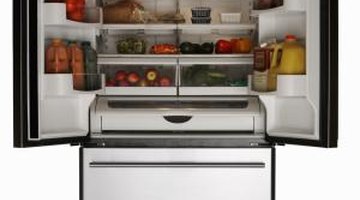Are Refrigerator Glass Shelves Good or Bad?
Americans purchase over 8 million refrigerators each year in a variety of styles, sizes and colors. Some consumers select these appliances based on aesthetics, while others focus on functionality. The selection of glass shelves is another choice facing buyers, and several factors -- including cost, convenience and resilience -- should be considered before a decision is made.
Durability

Glass refrigerator shelves are actually made of tempered glass, which is stronger, more durable and less prone to cracking and breaking than regular glass. As a result, these shelves are more durable than plastic shelves, which crack and break under stress, and wire shelving, which tends to sag under the weight of heavy objects. However, tempered glass shelves are not indestructible, and they can both crack and break under extreme pressure. Consumers purchasing glass refrigerator shelving should make sure they purchase the type of shelves that can be easily removed and replaced.
Aesthetics
Refrigerator shelving made of glass has a high-end look and is considered an upgrade to wire and plastic, which both have an economical appearance. Glass shelves have a cleaner, less cluttered look, and the transparency of the shelves makes it easy to locate objects in the refrigerator at a glance. Glass shelving also retains the original shape of refrigerated items, compared to wire shelving, which leaves unsightly indentations on soft items like fruit.
Cleaning and Sanitation
Spills on glass shelves can be easily wiped up with a paper or cloth towel. For thorough cleaning, a mild detergent in soapy water is all that is necessary. However, wire shelving is more time- and labor-intensive to clean since spills settle into the grates of the shelves and may require considerable elbow grease to remove. Glass shelving is also sanitary, since spills are contained on the glass shelves, as opposed to wire shelving, in which spills seep or splatter on the items below.
Safety
Even tempered glass shelving can break, which puts it at a disadvantage compared to both plastic and wire shelving. Plastic can crack, but does not necessarily break, and wire will normally just bend, although it may become dislodged from the refrigerator’s grooves. However, if a tempered refrigerator shelf does break, it will crumble into small pieces instead of a jagged and pointed formation, which reduces the possibility of injuries.
Writer Bio
Terri Williams began writing professionally in 1997, serving as media manager for a large nonprofit organization where she also edited books and created promotional content. She has written extensively on business communication, ethics, leadership, management, education and health. Williams has a Bachelor of Arts in English from the University of Alabama at Birmingham.
Photo Credits
- Ryan McVay/Photodisc/Getty Images
More Articles



